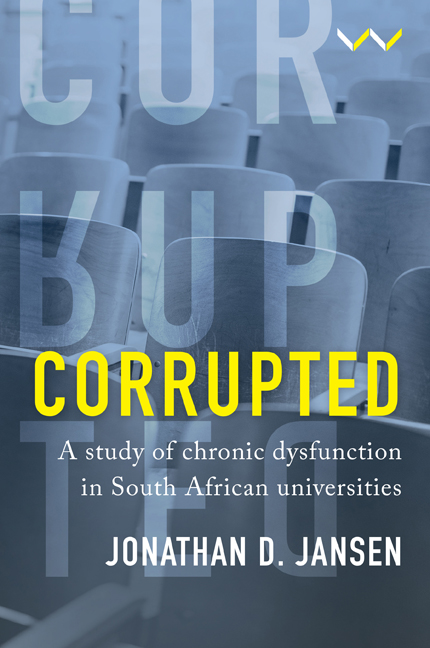Book contents
- Frontmatter
- Contents
- Acknowledgements
- Acronyms and Abbreviations
- Map: South African Universities
- Chapter 1 A Study of Chronic Dysfunction in Universities
- Chapter 2 Historical Roots of Dysfunction: Shaping the South African University
- Chapter 3 Dysfunctionality in Universities: A Political Economy Perspective
- Chapter 4 A Personal Journey Through the Political Economy of Universities
- Chapter 5 Casting Long Shadows: How History Shapes the Politics of Universities In South Africa
- Chapter 6 The University as a Concentrated and Exploitable Resource
- Chapter 7 The University as a Criminal Enterprise
- Chapter 8 The Micropolitics of Corruption in Universities
- Chapter 9 The Twin Roots of Chronic Dysfunctionality in Universities
- Chapter 10 Rethinking and Rebuilding Dysfunctional South African Universities
- Appendices
- Notes
- References
- Index
Chapter 10 - Rethinking and Rebuilding Dysfunctional South African Universities
Published online by Cambridge University Press: 29 November 2023
- Frontmatter
- Contents
- Acknowledgements
- Acronyms and Abbreviations
- Map: South African Universities
- Chapter 1 A Study of Chronic Dysfunction in Universities
- Chapter 2 Historical Roots of Dysfunction: Shaping the South African University
- Chapter 3 Dysfunctionality in Universities: A Political Economy Perspective
- Chapter 4 A Personal Journey Through the Political Economy of Universities
- Chapter 5 Casting Long Shadows: How History Shapes the Politics of Universities In South Africa
- Chapter 6 The University as a Concentrated and Exploitable Resource
- Chapter 7 The University as a Criminal Enterprise
- Chapter 8 The Micropolitics of Corruption in Universities
- Chapter 9 The Twin Roots of Chronic Dysfunctionality in Universities
- Chapter 10 Rethinking and Rebuilding Dysfunctional South African Universities
- Appendices
- Notes
- References
- Index
Summary
In the early months of South Africa's democracy, there was a significant confrontation between the nascent ministry of education, which sets policy, and the government department that executes it. The word in the air was ‘bailout’. It was painfully obvious that there were well-endowed white universities with world-class infrastructures, highly rated scientists and impressive financial reserves accumulated in the apartheid period; at the same time, there were under-resourced black universities with crumbling buildings, mediocre scholars and parlous finances. What made matters worse was that, as the white universities gradually opened up their racially exclusive admissions before the end of apartheid, the top black students deserted their racially designated institutions. This unexpected migration immediately plunged already vulnerable institutions into a major crisis of plummeting student numbers. With a government funding formula that allocated state subsidies largely on the basis of student enrolments, an already precarious situation became depressingly grim.
The minister of education (and his advisers) held the political position that there should be a major bailout of the historically disadvantaged universities to establish some degree of parity with the white institutions advantaged by a century of racial privilege in state funding. A massive bailout would not make all universities equal, by whatever definition, but it would at least provide a solid platform for the rebuilding of black institutions, in keeping with all the promises of reconstruction and development offered by President Nelson Mandela's new government.
The vice-chancellors of the black universities certainly thought a bailout was coming, a massive infusion of redress funding to correct the imbalances and injustices of the past. Banking on relief, university leaders opened access to all students, regardless of race or ethnicity, in the spirit of the new democracy. In a short period of time, the University of Durban-Westville would lose its majority Indian enrolments, and the University of the Western Cape its ‘coloured’ designation, as black African students took their rightful places in these public institutions. Modestto-significant reserves were spent as bursaries on the tens of thousands of poorer students who started to press through the newly opened ‘doors of learning and culture’, so poetically described in the ruling party's Freedom Charter. There was no institutional risk anticipated for the black institutions. The new government would surely bail them out.
- Type
- Chapter
- Information
- CorruptedA Study of Chronic Dysfunction in South African Universities, pp. 223 - 252Publisher: Wits University PressPrint publication year: 2023



